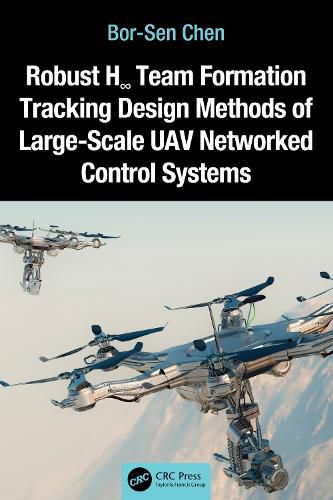Readings Newsletter
Become a Readings Member to make your shopping experience even easier.
Sign in or sign up for free!
You’re not far away from qualifying for FREE standard shipping within Australia
You’ve qualified for FREE standard shipping within Australia
The cart is loading…






This book introduces the centralized robust H? team formation tracking control strategy of multi-unmanned aerial vehicle (multi-UAV) network system under intrinsic random fluctuation, time-varying delay and packet dropout in wireless communication, and external disturbance. A simple robust decentralized H? proportional-integral-derivative (PID) reference tracking network control strategy is introduced for practical applications of team formation of large-scale UAV under control saturation constraint, external disturbance, and vortex coupling. It provides practical design procedures based on linear matrix inequalities (LMIs) solvable via LMI TOOLBOX in MATLAB (R).
Features:
Focuses on the stabilization of a QUAV under finite-time switching model control (SMC)
Discusses robustness control design for formation tracking in UAV networks
Introduces different robust centralized and decentralized H? attack-tolerant observer-based reference team formation tracking control of large-scale UAVs
Reviews practical case studies in each chapter to introduce the design procedures
Includes design examples of team formation of 25 quadrotor UAVs and a team formation example of five hybrid quadrotor/biped robot sub-teams
This book is aimed at researchers and graduate students in control and electrical engineering.
$9.00 standard shipping within Australia
FREE standard shipping within Australia for orders over $100.00
Express & International shipping calculated at checkout
This book introduces the centralized robust H? team formation tracking control strategy of multi-unmanned aerial vehicle (multi-UAV) network system under intrinsic random fluctuation, time-varying delay and packet dropout in wireless communication, and external disturbance. A simple robust decentralized H? proportional-integral-derivative (PID) reference tracking network control strategy is introduced for practical applications of team formation of large-scale UAV under control saturation constraint, external disturbance, and vortex coupling. It provides practical design procedures based on linear matrix inequalities (LMIs) solvable via LMI TOOLBOX in MATLAB (R).
Features:
Focuses on the stabilization of a QUAV under finite-time switching model control (SMC)
Discusses robustness control design for formation tracking in UAV networks
Introduces different robust centralized and decentralized H? attack-tolerant observer-based reference team formation tracking control of large-scale UAVs
Reviews practical case studies in each chapter to introduce the design procedures
Includes design examples of team formation of 25 quadrotor UAVs and a team formation example of five hybrid quadrotor/biped robot sub-teams
This book is aimed at researchers and graduate students in control and electrical engineering.